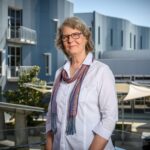
In this C4IE blog, QUT’s Professor Suzanne Carrington and Dr Glenys Mann warn against segregating children with disability.
The recent announcement that six more special schools are to be built in Queensland reminds us that progress on inclusive education can never be taken for granted.
International conventions on the right to an inclusive education have been ratified, a Royal Commission has highlighted the damage done by segregation and recommended strengthening of inclusive education, and award-winning inclusive education policies have promised a better way forward for students with disability.
Yet it is now clear inclusive education has not been guaranteed. While special schools operate, segregation will be an ever-present threat to students with disability.
The planned investment of $1.09 billion to build more special schools, the largest special school investment in the state’s history, underscores just how little respect the current Queensland government has for international conventions, research evidence, and recommendations from a Royal Commission, and how deeply committed it is to its dual system of mainstream + special schools.
Why does this matter?
We need to remind our leaders, and perhaps ourselves, of the damage done by segregating children with disability.
- Segregated schooling sets children on life trajectories with limited opportunities.
- Children are separated from their siblings and neighbourhood peers and communities when they are not welcome at their local school.
- Segregated settings negatively impact the nature, quality, and breadth of education provision.
- A binary system of general and special schools reinforces hierarchies that fracture communities and limit human potential.
- Segregation has profound economic and health implications for people’s future lives.
- Binary school systems put the interests of ministries of education and institutions above the interests of students with disability; and
- Segregated schooling compromises our democratic ideal. Inclusive education is a fundamental human right (United Nations, 2006; 2016).
So why does the current QLD government cling so tightly to the belief that specialist, segregated schools are necessary for students with disability?
Perhaps they believe in the myths about special schooling. We need to revisit and challenge these myths and remind ourselves about what is true:
- MYTH: Special schools are safer for students with disability.
FACT: Special schools are not always safe for children with disabilities. Issues have long been raised about safety in special schools due to the use of violent restrictive practices to deal with student behaviour; low expectations, segregated culture and limited inclusion in society, and lack of abidance with the Disability Standards for Education 2005. - MYTH: Parents have a choice regarding school enrolment for students with disability.
FACT: Parental preference for special schools often reflects the lack of genuine inclusive options, not informed choice. Parents consistently tell us their right to choose a school for their child has been restricted. This has been referred to as a Hobson’s Choice: the illusion of a free choice, when in reality there is no other option. A student’s right to be included also supersedes a parent’s right to choose a school (para 10a, GC4). - MYTH: Some students, because of the nature of their disability, can only be educated in specialist schools and regular schools are inadequate to the task of educating students with disability.
FACT: There are many examples of regular schools with models of practice that support quality, age-appropriate curriculum with individualised adjustments for students with complex learning profiles. We should be learning about how leaders support teachers and resource models of support in schools that promote inclusion.
How can we safeguard the precious steps we have taken towards inclusion for all? How do we ensure we keep moving in the right direction?
We need:
- To honour Australia’s ratification of the CRPD by transferring funding and resources from segregated settings to support the development of a truly inclusive single system, ending the dual system of mainstream and special schools.
- A national inclusive education strategy with alignment to state/sector policies that outline explicit responsibilities and accountabilities for school leadership and support structures for teachers.
- Appropriate resource allocation to support inclusive cultures and practices.
- Leadership that prioritises and is accountable for inclusion, not just standards.
- To recognise, nurture, and support inclusive teachers.
- A focus on evidence-based practices that are compatible with inclusion, and which do not perpetuate the mainstream + special model.
- Quality, research-informed professional learning to support models of collaboration between specialist educators and regular educators.
- Time allocation for support staff and specialist educators to collaborate with regular classroom teachers for co-planning and co-teaching.
- To foster collaboration between school staff, students, and families to build trust and cooperation.
We now have strong empirical evidence to be confident that inclusive education is the way forward.
Despite the retrograde step by the current Queensland government to increase the number of segregated schools, we see growing numbers of school leaders and teachers who are passionate about, and committed to, inclusive practice and who know that inclusive education supports better social and developmental outcomes for students with and without disability.
We are clear about the multiple academic benefits for students with disabilities when included in genuinely inclusive schools. It is also evident that successful examples of systemic change for inclusive education require an inclusive vision and mindset that is supported by policy, accountability, and resources for schools.
Our focus should be on ensuring commitment to student safety and wellbeing at all schools. Safe school environments are supported by ethical leadership, inclusive culture and practices, staff training, resources, and accountability.
What we need now is a government that looks forwards not backwards; a government that can safeguard the inclusive progress Queensland has made, not put it under threat. We need the largest ever investment in inclusive education in the state’s history!
In fact, we need this to occur nationally across borders, across systems, and across sectors. And that investment needs bipartisan support. No longer should public policy as vital as inclusive education be victim to the short-termism of party politics as it most recently has in Queensland.
 |
Professor Suzanne Carrington’s areas of expertise are in inclusive education, ethical leadership for inclusive schools, disability and teacher preparation for inclusive schools. She has engaged in research to inform policy and practice in Australian and international education contexts. She was the Program Director of Program 2: The School Years for The Cooperative Research Centre for Living with Autism (Autism CRC) (2013-2022). |
 |
Dr Glenys Mann is a Senior Lecturer in Inclusive Education with a particular interest in the inclusion of students with disability, and parents’ views and experiences regarding inclusive education. Her current research focus is parent-teacher partnerships in an inclusive education context and, specifically, the communication between teachers and parents. |